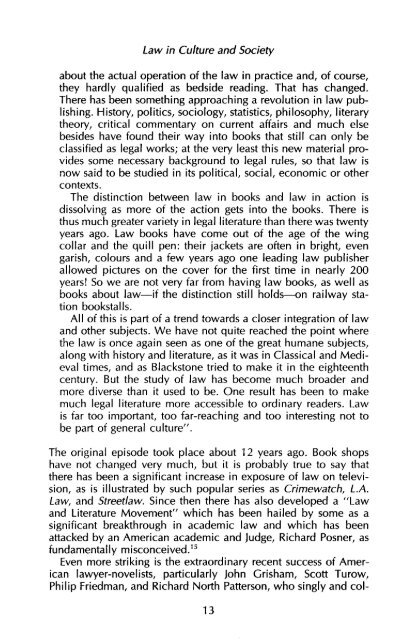Blackstone's Tower: The English Law School - College of Social ...
Blackstone's Tower: The English Law School - College of Social ...
Blackstone's Tower: The English Law School - College of Social ...
You also want an ePaper? Increase the reach of your titles
YUMPU automatically turns print PDFs into web optimized ePapers that Google loves.
<strong>Law</strong> in Culture and Society<br />
about the actual operation <strong>of</strong> the law in practice and, <strong>of</strong> course,<br />
they hardly qualified as bedside reading. That has changed.<br />
<strong>The</strong>re has been something approaching a revolution in law publishing.<br />
History, politics, sociology, statistics, philosophy, literary<br />
theory, critical commentary on current affairs and much else<br />
besides have found their way into books that still can only be<br />
classified as legal works; at the very least this new material provides<br />
some necessary background to legal rules, so that law is<br />
now said to be studied in its political, social, economic or other<br />
contexts.<br />
<strong>The</strong> distinction between law in books and law in action is<br />
dissolving as more <strong>of</strong> the action gets into the books. <strong>The</strong>re is<br />
thus much greater variety in legal literature than there was twenty<br />
years ago. <strong>Law</strong> books have come out <strong>of</strong> the age <strong>of</strong> the wing<br />
collar and the quill pen: their jackets are <strong>of</strong>ten in bright, even<br />
garish, colours and a few years ago one leading law publisher<br />
allowed pictures on the cover for the first time in nearly 200<br />
years! So we are not very far from having law books, as well as<br />
books about law—if the distinction still holds—on railway station<br />
bookstalls.<br />
All <strong>of</strong> this is part <strong>of</strong> a trend towards a closer integration <strong>of</strong> law<br />
and other subjects. We have not quite reached the point where<br />
the law is once again seen as one <strong>of</strong> the great humane subjects,<br />
along with history and literature, as it was in Classical and Medieval<br />
times, and as Blackstone tried to make it in the eighteenth<br />
century. But the study <strong>of</strong> law has become much broader and<br />
more diverse than it used to be. One result has been to make<br />
much legal literature more accessible to ordinary readers. <strong>Law</strong><br />
is far too important, too far-reaching and too interesting not to<br />
be part <strong>of</strong> general culture".<br />
<strong>The</strong> original episode took place about 12 years ago. Book shops<br />
have not changed very much, but it is probably true to say that<br />
there has been a significant increase in exposure <strong>of</strong> law on television,<br />
as is illustrated by such popular series as Crimewatch, LA.<br />
<strong>Law</strong>, and Streetlaw. Since then there has also developed a "<strong>Law</strong><br />
and Literature Movement" which has been hailed by some as a<br />
significant breakthrough in academic law and which has been<br />
attacked by an American academic and Judge, Richard Posner, as<br />
fundamentally misconceived. 15<br />
Even more striking is the extraordinary recent success <strong>of</strong> American<br />
lawyer-novelists, particularly John Grisham, Scott Turow,<br />
Philip Friedman, and Richard North Patterson, who singly and col-<br />
13

















